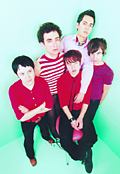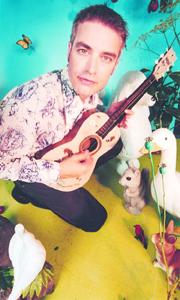EVERYONE’S TALKING ABOUT kids and violence. Is it alarming that teenagers, tots, and even infants are heeding their own private call to arms? No, not if you’ve grown up in a suburb, where entertainment choices range between watching Dawson’s Creek under the wary eyes of mom and dad or going out with friends to smash the neighbors’ mailboxes.
There is an alternative. Some kids gravitate not toward guns, but toward musical instruments. Like the Vogue. They’re from Kirkland, they’re fresh out of high school, and they’re challenging rock’s paradigm with a prodigiously developed sound that balances punk’s nihilistic thrash and art’s stylistic vision.
1. This Is Not Britney Spears. This Is Not the Backstreet Boys.
Meet the Vogue—Johnny, Adam, KC, Devin, and Hannah. Already, some playa-hatas find fault with our heroes from the Seattle ‘burbs, because, after all, they’re young, talented, and damn cute. Following a recent show in Olympia, an Internet music bulletin board buzzed with criticisms about the band’s aggressive sound and Johnny’s stage presence—a pendulum of pouting looks and assertive flailing. “They’re pretentious,” wrote one budding rock critic, echoing a dis that the Vogue hear frequently.
Yet the Vogue have fans as well. At Foxes on Capitol Hill a month ago, the Fab Five entertained a crowd of drag queens, indie rockers, and Romulans—those skinny, white-belt wearing, dyed-black-hair hipsters who populate the Hill and occasionally venture down to Belltown. In their element, the Vogue’s vibe was intense: KC Wescott’s darting keyboard vamps hinted at new wave, but Adam Miller’s bass, Devin Welch’s guitar, and Hannah Billie’s drums gave the songs a loud rock footing. And Johnny Whitney sang, squealed, and chattered; he was hunched over at times, but often he stared out from under his brown bangs, fixating on a spot just above the audience’s heads. His voice, his look, his volatility sent the message that whether or not you approve of the Vogue, you will have to reckon with them.
2. A Leonard Cohen Album on His Turntable
“It was kind of a tragic show that we met James at,” says Johnny, looking across the room at James Morelos, the owner of the Made in Mexico label. We’re all sitting in Adam’s basement apartment in the Central District. Skulls that look like they’re left over from Halloween celebrations hang on the walls. A Leonard Cohen album is on the old-school turntable, but it’s not playing. Adam chastises me and Hannah as we light up cigarettes indoors.
“He saw us at a show at Hi-Score Arcade,” Johnny continues, “and he was really into it. So he offered to put [a record] out. Up until that point we hadn’t taken ourselves very seriously. We got our shit together and recorded some songs.” Which led to the Vogue’s only recorded output thus far, a 7-inch with three spectacular tracks: “The Medicals,” a keyboard-and-drum-led jaunt with lyrics that sound like Johnny’s recounting the nightmare he had the night before a science test; “Bleach Stings the Eyes, But Elegance Has No Pupils,” a herky-jerky tune that could make you forget about Sleater-Kinney; and “Cardiac Arrest in 4/4 Time,” which blasts through its business in two punked-out minutes, then extends into a relaxed jam. Very nice.
James printed up 500 copies. They’re sold out.
The record took even the musicians who made it by surprise.
“Not to sound cocky or anything, but we were pretty amazed by it,” Hannah says.
“We didn’t have any expectations going into it, and it turned out like 3,000 percent better,” adds Johnny.
2 . What Do They Sound Like? A Tangent
Bands don’t like comparisons to other bands, and any self-respecting rock writer looks upon such a critical device the way a Frenchman regards a can of spray cheese. But that doesn’t stop the question from being relevant: What do they sound like?
“People always compare us to the Fall and none of us have ever heard the Fall,” notes Adam.
“The Make-Up’s twisted little brother,” went one of the less vitriolic posts to the Internet board.
(For the sake of those who don’t know these bands either, I’ll say this: British music press habitu鳠call it art-punk, but it’s basically an aesthetic that includes stop-start rhythms, piercing, intermittent sounds, indecipherable lyrics that nevertheless require a lot of thought, and
a whiff of religious fervor. Oh yeah, and at least one member has to be an art-school dropout.)
“There’s a strong, almost reactionary desire to not sound like other things,” Devin says.
Adam finishes off this lesson: “We’re influenced to not be like everybody else.”
3. Insert Bad Benetton Joke Here
“I think if I weren’t in this band and I was in the audience and saw us setting up, I’d be interested because there’s such a weird variety of people,” Adam postulates, tossing an orange from hand to hand. “Our little joke is: spics, dykes, and kikes. We’re not just five white kids with guitars—”
“We’re not five heterosexual males with guitars,” the others chime in, correcting their bassist.
What they are is three kids from Kirkland, one from Minneapolis, and one from . . .
“I’m from Seattle,” KC says preemptively.
Hannah ribs him: “KC would like everyone to know that he’s not from the Eastside.”
Johnny, Devin, and Hannah attended the same school for years, eventually coalescing into various bands before firming up the Vogue. KC signed on as bassist, but moved to keyboards when the original synth player got the boot. Adam came from Minnesota and matriculated at Cornish, but he quit and at 20 became the band’s elder member—and its token art-school dropout.
4. What Ever Will They Do Next
Now that you’ve gotten to know the Vogue, you still may not like them. You may go to their show or hunt down a copy of the 7-inch or sit on the edge of your chair until they release their full-length debut later this year, and you may say, “They suck.” Or “They’re pretentious.” Or “They are the future of rock.” But what makes the Vogue special, regardless of what anybody says about ’em, is that they’re sincere. They’re not in it for the money, but they wouldn’t mind making some. They’re not poseurs, because that would require more thought than just doing what they do. And, like most bands that ascend to greatness, they evolve and work at their skills.
Soon, the Vogue will make their album, and the sun will come out, and it will be a new day.
“Most bands that I held in high regard seem to have lost their spirit in the last couple of years,” Johnny says.”If this record could do one thing, I would want it to [show] people that we have pure intentions.”
KC looks like he agrees, then blurts out (to the amazement of everyone in the room): “It’s like stained glass without color or an orgasm without love—there’s no purpose if the intentions are gone. I’d say our intentions are pure and that’s paramount. That’s where the art is.”
More Music Quarterly






